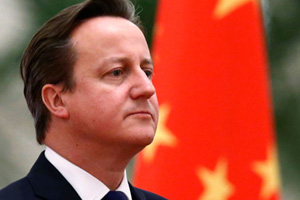
Full Text of Chinese Premier Li Keqiang's speech to British think tanks
Comments Print Mail Large Medium Small
In the modernization drive of such a populous country like China, there is no example to follow. We face a whole range of challenges and need to make hard exploration and efforts. After decades of fast growth, China' s growth has moderated to a medium-to-high speed compared with the double-digit rate in the past. Some people begin to worry that the Chinese economy will not maintain sustained growth and will head for a hard landing. I can assure you that such things will not happen, because economic growth in China is supported by urbanization and industrialization. What is more, there are big gaps between urban and rural areas and among different regions as well as unreasonable industrial structure. All these mean potential and huge domestic demand for China' s development. As long as we keep to the right direction and work hard, we will be able to maintain medium-to-high growth of the Chinese economy for a long time to come.
Since the beginning of this year, the Chinese economy has maintained stability on the whole despite considerable downward pressure. We will continue to follow a proactive fiscal policy and a prudent monetary policy. We will not resort to massive stimulus measures; instead, we will further innovate the thinking and model of macro-regulation, combine a ranged approach with a targeted approach in adjustment, strengthen anticipatory adjustments and fine-tuning, ensure economic growth will stay within a proper range between the minimum rate needed for job creation and the CPI growth ceiling to keep inflation under control. We have confidence in meeting the growth target of about 7.5% set for this year. This will also lay a solid foundation for our future development.
China' s economic aggregate has exceeded US$9 trillion. An annual growth of around 7.5%, adjusted for inflation, will be translated to an increment of about US$1 trillion, equivalent to a medium-sized economy. This is no easy job, but it will bring huge business opportunities to China and the world. I have given you so many figures, not to play a game of numbers though, but to show you that China has the condition and ability to promote balanced, coordinated, sustained and healthy economic development.
Third, on China' s peaceful development.
To achieve modernization in a big developing country like China and to fulfil the Chinese dream of great national renewal requires a peaceful international environment and stable neighbourhood. Otherwise, we cannot focus on development. This is an irrefutable truth.
The Chinese people love peace. Our ancestors taught us that we should not do to others what we don' t want others to do to us and that we must help others achieve success if we want to achieve success ourselves. This has been imprinted into the DNA of the Chinese nation and become an accepted code of conduct for the Chinese people. Expansion is not in the Chinese DNA, nor does China subscribe to the logic that a strong country is bound to be hegemonic.
The achievements China has made through development in the past three decades are attributable to an external environment of peace and stability. The path of peaceful development has benefited the Chinese people and enabled different countries to achieve win-win development. This is the one thing important we have learned from our development over the past decades and we will never give it up. China will remain committed to inclusiveness, openness, peace and cooperation even after it becomes stronger in the future.
China is a major responsible country. China stands for mutual respect, equality and peaceful coexistence among countries and acts in accordance with the UN Charter and the norms governing international relations. China calls for peaceful settlement of disputes and conflicts through diplomatic channels and opposes the use of force or interference in other countries' internal affairs. China is steadfast in pursuing the path of peaceful development and follows a win-win strategy of opening-up. China is ready to work with other countries to foster an international environment of enduring peace.
China has over the years contributed significantly to peace and stability in Asia. Thanks to the common ground China reached with neighboring countries for cooperation and win-win progress, a sound atmosphere has been created for handling differences through negotiations and consultations, hence the prosperity and development of East Asia today. China follows a neighbourhood policy of building friendship and partnerships with surrounding countries and wants to live in peace with all its neighbors. But for those acts of provoking incidents and undermining peace, China will have to take resolute measures to stop them so as to prevent the situation from getting out of control and bring the situation back to the track of dialogue and negotiations. I believe as long as countries in the region could engage in dialogue and negotiations with sincerity and in good faith, the environment of peace and tranquility will be maintained.
History tells us that war means the failure of human wisdom. Peace is the result of reflection on disasters and sufferings. As the former British Prime Minister Winston Churchill once said, "In history lies all the secrets of statecraft. Those that fail to learn from history are doomed to repeat it." We must learn lessons from the past, face history squarely and be forward-looking. We need to seek political settlement of international and regional issues, and work together to counter traditional and non-traditional security challenges and advance prosperity and development of the world.
Fourth, on China' s reform and opening-up.
China' s modernization needs not only a peaceful and stable external environment, but also strong impetus from reform and opening-up. China' s big population means tremendous creativity and its market has huge vibrancy. I once worked as the Party secretary of a village production team in Fengyang county, Anhui province back in the 1970s, a time of the planned economy. I was responsible for assigning work to the hundreds of farmers in the village every day. The villagers worked hard in the field from dawn to dusk, but still they could make very little for a decent meal. Later, to enforce rural reform, the system of household contract responsibility was introduced, which gave villagers the right to decide what crops to grow and how to grow them. In just a few years, food was no longer a problem. It is reform and opening-up that has given hundreds of millions of Chinese vast space for pursuing their own development, and spurred steady social progress. Reform has led to fast development of China. It has provided a driving force for economic growth today and it will sustain China' s development in the years to come.




